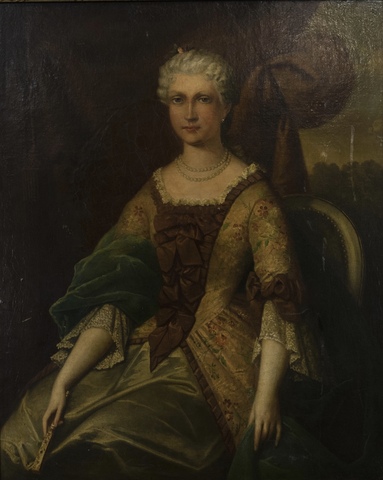Annotation:Lady Erskine: Difference between revisions
No edit summary |
No edit summary |
||
| (8 intermediate revisions by 2 users not shown) | |||
| Line 1: | Line 1: | ||
---------- | |||
---- | {{TuneAnnotation | ||
|f_tune_annotation_title= https://tunearch.org/wiki/Annotation:Lady_Erskine > | |||
'''LADY ERSKINE.''' Scottish, Reel. A Dorian. Standard tuning (fiddle). AAB. | |f_annotation=[[File:Harrietstclair.jpg|500px|right|thumb|Harriet St Clair-Erskine, Countess of Rosslyn]]'''LADY ERSKINE.''' Scottish, Reel. A Dorian. Standard tuning (fiddle). AAB. "Lady Erskine" was composed by [[biography:James Walker]] (1771-1840) of Dysart, Fife, a professional musician and music teacher, who published his first collection in 1793-4. Walker dedicated his second collection to Lady St Clair Erskine of Sinclair, the spouse of Sir James St Clair-Erskine (Erskine), 2nd Earl of Rosslyn (1762-1837), to whom he had dedicated his first collection. Lady Erskine was born Harriet Bouverie (1771-1810), daughter of Hon. Edward Bouverie, MP, and Harriot Spencer. She married in 1789 at age 18 and had six children before passing away at age 38. | ||
<br> | <br> | ||
<br> | <br> | ||
She was a good friend of Lady Dalkeith, to whom Sir Walter Scott wrote soon after Lady Harriet's death, remarking, "Poor Lady Rosslyn is gone, with all the various talent and vivacity that rendered her society so delightful. I regret her loss the more, as she died without ever making up some unkindness she had towards me for these foolish politics. It is another example of the great truth, that life is too shore for the indulgence of animosity." Apparently, Lady Harriet had written to Scott taking offense to a song he had sung at a dinner for the acquitted Lord Melville; the song gave great offense to others of his friends as well. Lady Rosslyn’s ire was indeed considerable. Lady Bessborough wrote in August, 1808, to Lord Granville Leveson-Gower: | |||
<blockquote> | |||
''We dine again at the Rosslyns….Lady Rosslyn really would be very pleasant if it were not for her party violence, which exceeds'' | |||
''everything I ever met with. She will not admit any of Walter Scott’s Poetry into the house, and in shewing me his cottage'' | |||
''said ‘the Beast who us’d to live there and who I wish hanged’, and in passing Lord Melville’s park she leant back lest she'' | |||
''should be obliged to bow to Mr. R. Dundas (a politician) and said, ‘I believe nothing will kill the old Devil; he ought to'' | |||
''have been dead long ago’—‘and Damn’d,’ added Mr. Broughham.'' | |||
</blockquote> | |||
The melody appears as "Lady Eshkin's reell" in the music manuscript collection of Spithope, Northumberland, musician John Robson [http://www.asaplive.com/archive/detail.asp?id=U0100800], dated February, 1874. | The melody appears as "Lady Eshkin's reell" in the music manuscript collection of Spithope, Northumberland, musician John Robson [http://www.asaplive.com/archive/detail.asp?id=U0100800], dated February, 1874. | ||
|f_source_for_notated_version=Kenny Chaisson (b. 1947, Bear River, North-East Kings County, Prince Edward Island; now resident of Rollo Bay) [Perlman]. | |||
|f_printed_sources=Cranford ('''Jerry Holland: The Second Collection'''), 2000; No. 44, p. 18. Glen ('''The Glen Collection of Scottish Dance Music'''), vol. 2, 1895; p. 44. Perlman ('''The Fiddle Music of Prince Edward Island'''), 1996; p. 104. | |||
|f_recorded_sources=Jerry Holland - "Lively Steps" (1988). | |||
|f_see_also_listing=Alan Snyder's Cape Breton Fiddle Recording Index [http://www.cbfiddle.com/rx/tune/t907.html]<br> | |||
}} | |||
------------- | |||
Alan Snyder's Cape Breton Fiddle Recording Index [http://www.cbfiddle.com/rx/tune/t907.html]<br> | |||
---- | |||
Latest revision as of 04:20, 17 July 2022
X:1 T:Lady Erskine’s Reel C:James Walker (1771-1840), Dysart M:C| L:1/8 R:Reel B:James Walker - Collection of new Scots reels, strathspeys, jigs, &c. (1793-4, p. 2) Z:AK/Fiddler’s Companion K:Amin E|A2AB c2 BA|Bdgd BGGB|A2 AB (cd)ea|gegB A2-A:| g|abag eg a2|gage de g2|abag e^fge|dBgB A2Ag| abag eg a2|gage de g2|aabg a^fge |dBgB A2-A||

She was a good friend of Lady Dalkeith, to whom Sir Walter Scott wrote soon after Lady Harriet's death, remarking, "Poor Lady Rosslyn is gone, with all the various talent and vivacity that rendered her society so delightful. I regret her loss the more, as she died without ever making up some unkindness she had towards me for these foolish politics. It is another example of the great truth, that life is too shore for the indulgence of animosity." Apparently, Lady Harriet had written to Scott taking offense to a song he had sung at a dinner for the acquitted Lord Melville; the song gave great offense to others of his friends as well. Lady Rosslyn’s ire was indeed considerable. Lady Bessborough wrote in August, 1808, to Lord Granville Leveson-Gower:
We dine again at the Rosslyns….Lady Rosslyn really would be very pleasant if it were not for her party violence, which exceeds everything I ever met with. She will not admit any of Walter Scott’s Poetry into the house, and in shewing me his cottage said ‘the Beast who us’d to live there and who I wish hanged’, and in passing Lord Melville’s park she leant back lest she should be obliged to bow to Mr. R. Dundas (a politician) and said, ‘I believe nothing will kill the old Devil; he ought to have been dead long ago’—‘and Damn’d,’ added Mr. Broughham.
The melody appears as "Lady Eshkin's reell" in the music manuscript collection of Spithope, Northumberland, musician John Robson [1], dated February, 1874.

